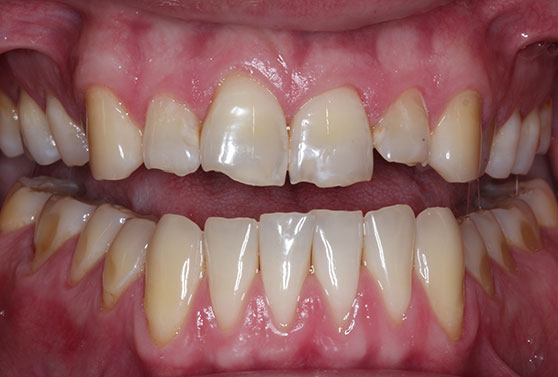Tooth Erosion
During your exam we will be looking for any signs of tooth erosion and wear. Tooth erosion can come from grinding your teeth or from acid and results in loss of tooth structure and weakened teeth.
Teeth Grinding and Tooth Erosion
Most of teeth grinding and tooth erosion has been determined to be connected to the central nervous system. For people that grind during the day there’s not normally any treatment that can be done other than becoming aware that you are grinding. If there is wear present on your teeth and you do not find yourself grinding during the day, we will recommend a night guard. It takes a while for wear patterns to develop on teeth so by the time we recognize it, grinding has been happening for some time. A night guard will not stop you from grinding but will protect your teeth from touching when you do grind. Wearing a guard not only protects your teeth from further wear but also is a much more inexpensive option than having to worry about further breakdown of your teeth and the need for multiple crowns in the future.If you have tried to wear a night guard in the past but thought it was too bulky, take a look at ours in our cases section and see that we can provide you with a much thinner option that is still strong and will last for years. Dr. Micheal has been wearing a guard for the past 10 years and is a great resource if you have questions.
New studies have also shown a direct correlation to grinding and sleep apnea or enlarged tonsils in kids and adults. If you have a history of sleep apnea and show signs of wear then there could be a connection.
There are some prescription drugs on the market that have shown to reduce grinding however, their side effects outweigh any help they could provide at this time.
Additional Information
Other Causes of Tooth ErosionAside from grinding your teeth, other common causes of tooth erosion are:
- Drinking too many soft drinks or juices
- Dry mouth
- A high-sugar diet
- Acid reflux
- Medications
- Plaque
Signs You Need to See a Dentist
When there is erosion in your teeth, your protective enamel wears down, exposing the sensitive dentin underneath. You will know if you have an eroded weak enamel if your teeth are sensitive to extreme temperatures or sweets. Your teeth may also appear discolored, cracked, or indented on their surface. Eroded teeth are more at risk to common tooth problems like decay or cavities, so it is important to see your dentist as soon as you notice a problem.How to Prevent Tooth Erosion
The best way to prevent this problem from occurring is to maintain a solid home care regimen. Brush your teeth at least twice a day but no more than three times a day. You should also floss once a day and use an alcohol-free mouthwash to rinse out any remaining bacteria that may harm your gums and teeth.By keeping up a good oral hygiene, you will keep plaque at bay and keep your teeth free from food particles that wear down on your enamel by attracting enamel-destroying bacteria and acids. You will also have the bonus of avoiding gingivitis, which often leads to more costly interventions and health problems.
Acid reflux can also wear down your enamel. By addressing the source of your gastrointestinal condition, you can reduce the occurrence of acid reflux which will help prevent tooth erosion. Other sources of erosion can also be from eating disorders.
You should cut down on sweets and soft drinks. It is okay to indulge occasionally, but make sure to brush your teeth after consuming foods and beverages that are highly acidic or damaging to your teeth. Sugary foods are not only bad for your teeth but are detrimental to your total health when consumed too frequently. By eating a balanced diet, you also benefit in other ways like reducing your risk of developing other health conditions.
Your oral health is very much tied to your total health. The better you take care of your teeth and gums, the better off your body will be as well. Visiting the dentist regularly can also help monitor your overall health, which is why it is highly recommended you see a dentist at least twice a year for a regular checkup and cleaning. If you have more questions about tooth decay and how to prevent it, contact us.

